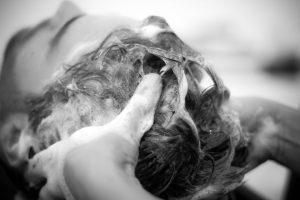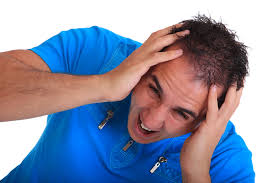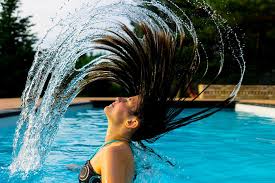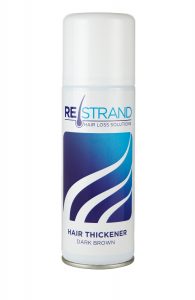Home » Hair Loss And Lifestyle (Page 5)
Category Archives: Hair Loss And Lifestyle
Use Caution When Considering Natural Hair Loss Remedies
In today’s society, the term ‘natural’ seems to denote that whatever the term is describing is also ‘good’. While it may be true that many natural things are good for you, the two terms do not always equate to being the same thing. There are many dangers found in nature, and just as we have several substances that are beneficial to our health, there are also many that are detrimental. The same goes for hair loss treatments.
So-called hair loss experts will tout many big ideas about what types of natural remedies might help a person suffering from hair loss, but they often make these claims as blanket statements without considering the individual needs and situations of the people they are giving their information to. There are also many theories which come from the distant past which all seem to have a solution to the problem of thinning hair. However, these old ideas are generally based on old wives tales, hearsay and home-based concoctions- anything but any actual scientific proof. There are a plethora of natural remedies that abound on the internet, and while most are harmless, some of them inevitably come with the risk of causing much more harm than good to your hair.
One example of a natural hair treatment that can have adverse effects, for people who are already suffering from certain conditions, is called Amla. Amla is a very common ingredient found in natural hair loss remedies, and while it may have some positive effect on hair growth of perfectly healthy people, Amla is also linked to lowering blood sugar levels, slowing liver functions, and increasing blood flow. That means anyone with liver disease, diabetes, or any other condition where proper blood flow is a factor in the severity of it, must approach this remedy with caution.

Another common idea that people have is that the fenugreek plant can help curb hair loss. There is currently no scientific data to support those claims, but there are plenty of studies which have been done to show that fenugreek can be harmful. Fenugreek can have adverse effects on the stomach when taken in large quantities which can be especially harmful for pregnant women as it can cause the uterus to contract. Fenugreek is also linked to lowering blood pressure so should be used with caution when used in conjunction with certain prescription medications and for those suffering from blood disorders. If you are planning on trying this ‘miracle cure’, it is probably wise to review your strategy and seek medical advice.
Although most of the natural remedies that are advertised to help with hair loss are ineffective and sometimes dangerous, there are other natural things that you can do to rule out the possibilities of self-inflicted hair loss. It is true that there isn’t much that we can do about genetic, male-pattern baldness, but when genes aren’t responsible for the condition there are a few things that can be done. For one thing, when hair loss is caused by dietary needs or stress, the problem can be reversed by correcting the underlying problem that is causing the condition. When hair loss occurs as a result of scalp-related diseases or excessive dryness, there are many treatments that can help by (re)creating a healthy environment for which hair can grow. By finding the underlying cause of your hair loss, you will be much more successful in treating your condition.
For a completely safe solution to hair loss please see our hair thickening spray which helps to hide hair loss.
Steer Clear of Hair-Thickening Shampoos
It may seem a bit obvious to those who have never had to deal with the issue of hair loss but putting a lot of products on the scalp that do not completely rinse off causes excessive build up over time, and can be counterproductive.
It can be quite difficult to see through the maze of products that all promise to be the next best thing when it comes to revitalizing the hair. Each product on the shelves says that it makes hair thicker and fuller, but the problem is that they never say just how they go about achieving the claims they make.
For the distraught person who is suffering the unfortunate experience of losing their hair, all of these products begin to look great, and the promises they make begin to make a lot of sense, even without any kind of proof or explanation. The companies that sell hair loss shampoos often create products that make the scalp feel tingly and fresh, and that can be a convincing feeling to those looking for a fast solution to a complex problem. These same companies understand the emotional drive that gets people to buy their products and they do a great job with capitalizing on that fact.

The tingly feeling on the scalp coming from hair loss shampoos drives sales and is often caused by the inclusion of too many ingredients in the formula. These ingredients are used specifically to provide a clean feeling, but when it comes down to whether these ingredients are actually making the hair any cleaner, it is quite clear that they are not. What they are doing is making the shampoo even more complicated which makes it harder for the body to handle.
Another problem with hair thickening shampoos is that they begin to damage the hair when used at high frequencies. In fact, almost every kind of shampoo can damage hair because it strips away so much of the natural oils and moisture that should be left alone. The key to maintaining healthy hair is finding the balance between how often the hair is washed and how much of the body’s natural oils remains in the hair and on the scalp. There are many hair loss shampoos that actually make it more difficult for the scalp to recover because it is being continually stripped clean of the oils it uses to protect itself. Couple that with the excessive build-up left behind by the shampoo, and the result is a condition that is anything but conducive to healthy hair growth.
A simple rule of thumb for a healthy and well-functioning scalp is that it is always better to use shampoos with fewer ingredients and with simpler formulas. Shampoos that completely rinse out of the hair when used will not create any chemical build-up, and as a result, it becomes easier for the scalp to function as it should. When complex hair care products are used, it is important to keep them off the scalp to prevent any unnecessary irritation or reaction that could very easily make the problem worse than it needs to be.
For a safe solution to hair loss check out our hair thickening spray.
Is Stress Causing Your Hair Loss?
While genetic pattern balding may take the stage as the most common cause of hair loss, it is definitely not the only one. It is important to be aware of other potential causes of hair loss, especially if you are beginning to consider a treatment plan that can cost a lot of money, and take a considerable amount of time to show any positive results. Of all the possibilities other than pattern baldness, stress is one of the most common factors that can make one lose hair. This can be both good and bad news depending on how you look at it. Although identifying sources of stress and then figuring out how to eliminate it can potentially reduce the stress-related hair loss, and sometimes even reverse it, changing our lifestyles and outlook on life can be a little difficult sometimes.

There are three types of stress-related hair loss and each is unique in its own way. Telogen effluvium is the most common stress-related condition causing hair loss. When a person suffers from a significantly stressful event, the body can send signals to the hair follicles which sets them into a resting phase. When this happens, the person is unaware that any damage has occurred, but after a few months they will experience a high degree of hair loss as the follicles ‘let go’ of the hair. While telogen effluvium is a passive bodily reaction to stress that often flies under the radar, there is another common cause of hair loss from stress called Trichotillomania. People who suffer from this type of stress-related hair loss actually pull their hair out when they are feeling stressed or depressed. While it may seem that this would be an easy condition to treat, people who suffer from this condition generally act on irresistible urges which are difficult to control. The third, and final, condition causing stress-related hair loss is called Alopecia areata. Alopecia areata is a far more serious condition which is triggered by intense stress. This condition causes the body’s immune system to attack the hair follicles making them fall out in large quantities in a short amount of time.
The most difficult part about suffering from hair loss caused by stress may be the hair loss itself, but it is more likely that stress may be a more important thing to get a handle on. It is generally understood that stress is a major cause of many illnesses, and if a person is suffering from enough stress to make their hair fall out it is likely that they may be in line for other stress-related problems as well.
To reduce stress, there are a few things that everyone can do. A combination of a good diet, plenty of sleep, exercise, and leisure activities is necessary for healthy living. If any of these are missing from a person’s life, there is a very good chance that they are experiencing stress at levels beyond what would normally be considered healthy. It is also a good idea to review any medications as many of them have serious side effects that can lead to both mental and physical stress. By managing stress, there are so many health benefits that come along with it, and maintaining healthy hair is one of the things that people can enjoy.
If hair loss is causing you stress our hair loss concealer provides an instant solution.
Enjoy the pool this summer but stop harmful chlorine damage
In the summer months, when the weather starts to get warmer, there is nothing better than heading to the nearest pool to cool off. For those that suffer from hair loss, a simple trip to the pool can be a cause for concern, but it doesn’t have to be. While hair thickening spray can help to bring back the confidence of having a fuller head of hair, many become concerned over the possible damage that chlorine can cause hair. However, with a bit of preparation before going to the pool and some easy to follow guidelines for after, a trip to the pool doesn’t have to damage your hair or knock your confidence.

The Effect of Chlorine on Your Hair
The majority of pools add chlorine to the water to stop the formation of bacteria and to keep the pool safe to use. The side effect to the added chlorine is that it begins to remove the natural oils in hair; oil is used as the natural barrier against damage. With repeat exposure to chlorine, hair can start to show the signs of damage, becoming increasingly drier, brittle and often frizzy.
The levels of chlorine in a pool would have to be substantial to cause these effects instantly, but the damage that can accumulate over time can be concerning to those who already have damaged hair or who suffer from genetic baldness or other types of hair loss. While the chlorine can’t be removed from public pools, the effect it has on hair can be severally reduced.
Preventing Chlorine Damage
There are a number of easy ways to minimise chlorine damage, whether you swim regularly or just take a trip to the pool on hot days. Implementing a few prevention techniques will take the worry out of going for a swim and help your hair to stay in top condition.
- Invest in a high-quality swim cap– A swim cap is ideal for frequent swimmers who want to completely remove the worry of chlorine damaging their hair. Not all styles of swim cap are the same, with some providing more protection than others, so finding one that fits snuggly is vital.
- Shampoo and condition your hair– To combat chlorine stripping your hair of its natural oils, make sure that after every trip to the pool you use natural oil boosting shampoos and conditioners. To keep your hair in good condition, giving it back the oils it needs is very important.
- Benefit from hair pampering– Indulging in a pampering session of leave-in conditioner for your hair every couple of weeks, especially during swim season, will help to keep it in good condition. Using deep conditioners will ensure the nutrients in your hair are replenished after swimming.
- Add a new barrier to your hair– With chlorine breaking down your hairs natural barrier, adding another barrier can prevent excess damage from chlorine. This can be easily achieved by wetting your hair before a swim. Even more protection can be gained by using spray conditioners after dampening your hair to stop the strands absorbing chlorine.
Nobody should have to avoid the pool because of concerns over hair loss and chlorine damage. There are many options available to those that have experienced hair loss and with our easy to use spray on hair thickener to maintain quality coverage, confidence doesn’t have to be lost in or out of the pool.
Hair transplant post-op info
Hair loss is a common problem in both men and women. Those that suffer from hair loss, particularly in cases of male pattern baldness or a maturing hairline, often choose to undergo a hair transplant procedure. The surgical operation allows those who suffer from baldness to gain a new lease on life and benefit from a fuller head of hair.
There are two methods widely used for hair transplantation: follicular unit extraction, abbreviated as FUE and follicular unit strip surgery, known as FUSS. FUE involves the individual removal of hair follicles, often from the back of the head, while FUSS involves removing a strip of follicles from a donor site on the body for use on the scalp.

As with any surgical operation, after a hair transplant there are a number of protocols that patients must follow in order to keep their scalp protected and allow for the hair to regrow. These include immediate care, vital care within the first two weeks and ongoing care to ensure that the best regrowth is enabled. Once the hair has started to regrow, hair thickening spray can then be used to create a full natural look.
The Days Following Your Procedure
Immediately after the hair transplant surgery, the area will be extremely tender and the doctor will generally wrap the scalp in bandages to prevent infection and to protect the area. The first few days after surgery are some of the most important days and certain care must be provided to the area if the transplant is to be a success. For the first 12 hours after the procedure, many doctors require that a saline solution is sprayed onto the scalp at 20-minute intervals.
While the area cannot be touched, the solution must be applied to every follicle and once the 12 hours are over, after sleep, this has to be continued at 30-minute intervals for up to 3 days. The process stops scabs from forming on the tender area and enables the grafts to stay fully hydrated.
The First Two Weeks of Care
After the first 3 days, a regime of shampooing is suggested to keep the area clean and hydrated. Every day a mixture of approved shampoo and water must be applied to the scalp and then gently wiped away afterwards. After between 7 and 10 days, any stitches used in FUSS procedures will be removed but the careful regime of shampoo washing is generally advised to continue up until 14 days after the operation.
Ongoing Care After Your Hair Transplant
Once the first 14 days are over, the level of care needed to maintain the area significantly reduces and it is advised to return to a normal regime of hair washing. However, any intense activity could still agitate the area, so refraining from excessive exercise or heavy lifting is advised for at least 2 more weeks.
Hair Thickening Spray Post-Op
It often takes a period of 12-18 months for hair to regrow fully after a transplant, but in many patients the hair will see some growth after a period of 3 months, after the transplanted hair has fallen out. During this time and ongoing, hair thickening spray is commonly used to make the new hair appear fuller. The best quality hair thickening spray works unobtrusively with transplanted hair to further increase the thicker appearance, helping people to get the most out of their hair transplant.


Recent Comments